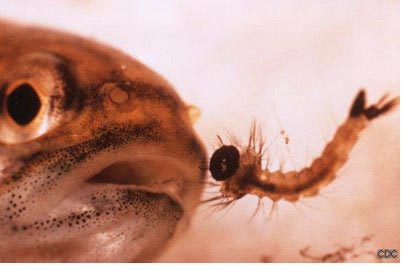Got West Nile fears? Go fish
September 9, 2010
 Dead birds, slimy abandoned swimming pools and bloody-thirsty mosquitoes might sound like plot elements from a B horror movie. But they’re all possible harbingers of a real-life hazard in our midst—the West Nile virus.
Dead birds, slimy abandoned swimming pools and bloody-thirsty mosquitoes might sound like plot elements from a B horror movie. But they’re all possible harbingers of a real-life hazard in our midst—the West Nile virus.
Fortunately, there’s a real-life weapon against the pesky insects, which can spread West Nile to humans after feeding on birds infected with the virus. That’s the mosquitofish, a.k.a. Gambusia affinis, which makes a meal out of mosquito larvae before they can grow up to make a meal out of us. Mosquitoes are more than just a backyard annoyance; in addition to West Nile, they can spread various strains of encephalitis and other diseases to humans.
And, because of the surge in home foreclosures in recent years, mosquitoes have found a new Southern California breeding ground—abandoned swimming pools. While the impact of these pools on the mosquito population can’t be quantified, “home foreclosures are definitely a factor,” said Crystal Brown, public information officer for the Greater Los Angeles County Vector Control District.
The fish are an effective, non-chemical way to keep mosquitoes from proliferating in garden ponds, animal drinking troughs and other standing water sources. Brown said that since 2005, more than 1,200 requests for the free fish have poured in to her district—one of five in the county. The fish should never be placed in natural habitats such as creeks and streams, or in drainage culverts that lead to waterways, however, because of harm they could cause to wildlife there. (Read up on the proper use of mosquitofish here.)
Overall, West Nile activity so far this year has been slower than last year, perhaps partly because of a cooler-than-usual summer.
But public health officials say this season’s first human case recently was confirmed in a Los Angeles County teenager, pointing up the need to be aware of the symptoms and vigilant about potential mosquito breeding grounds. The teenager, from the eastern part of the county, has recovered.
Most mosquitoes don’t carry the virus, and fewer than 1 in 150 people who are bitten by an infected mosquito go on to become seriously ill. But for those who do, “it isn’t a pleasant disease,” said Dr. David E. Dassey, deputy chief of Acute Communicable Disease Control for the public health department. “The problem comes in older individuals who have other chronic medical conditions.”
The vast majority of others experience only mild symptoms—which can include fever, headache, nausea, body aches and skin rashes—or none at all. They also come away with lifelong immunity to the virus.
To be on the safe side, Dr. Jonathan E. Fielding, the county’s director of Public Health, recommends using an insect repellant containing DEET when outside in mosquito-prone areas, particularly at dawn or dusk.
In addition, the county Public Health Department’s Environmental Health Bureau encourages anyone who spots a “green pool” to report it by calling (626) 430-5200. And because mosquitoes pick up the disease from infected birds, health officials are asking the public to promptly call the state’s “Dead Bird Hotline” if they spot a bird carcass. The number is (877) 968-2473. Reports also can be filed online.
The West Vector and Vector-Borne Disease Control District, covering the Third Supervisorial District, has a helpful website with questions and answers about West Nile, along with useful links and phone numbers, including one for requesting those free mosquitofish. Call (310) 915-7370 for information on when and where to pick them up.
And keep in mind that this is strictly a BYOB operation—meaning bring your own bucket.
Posted 9/9/10












 405 bridge work causes a stink
405 bridge work causes a stink
